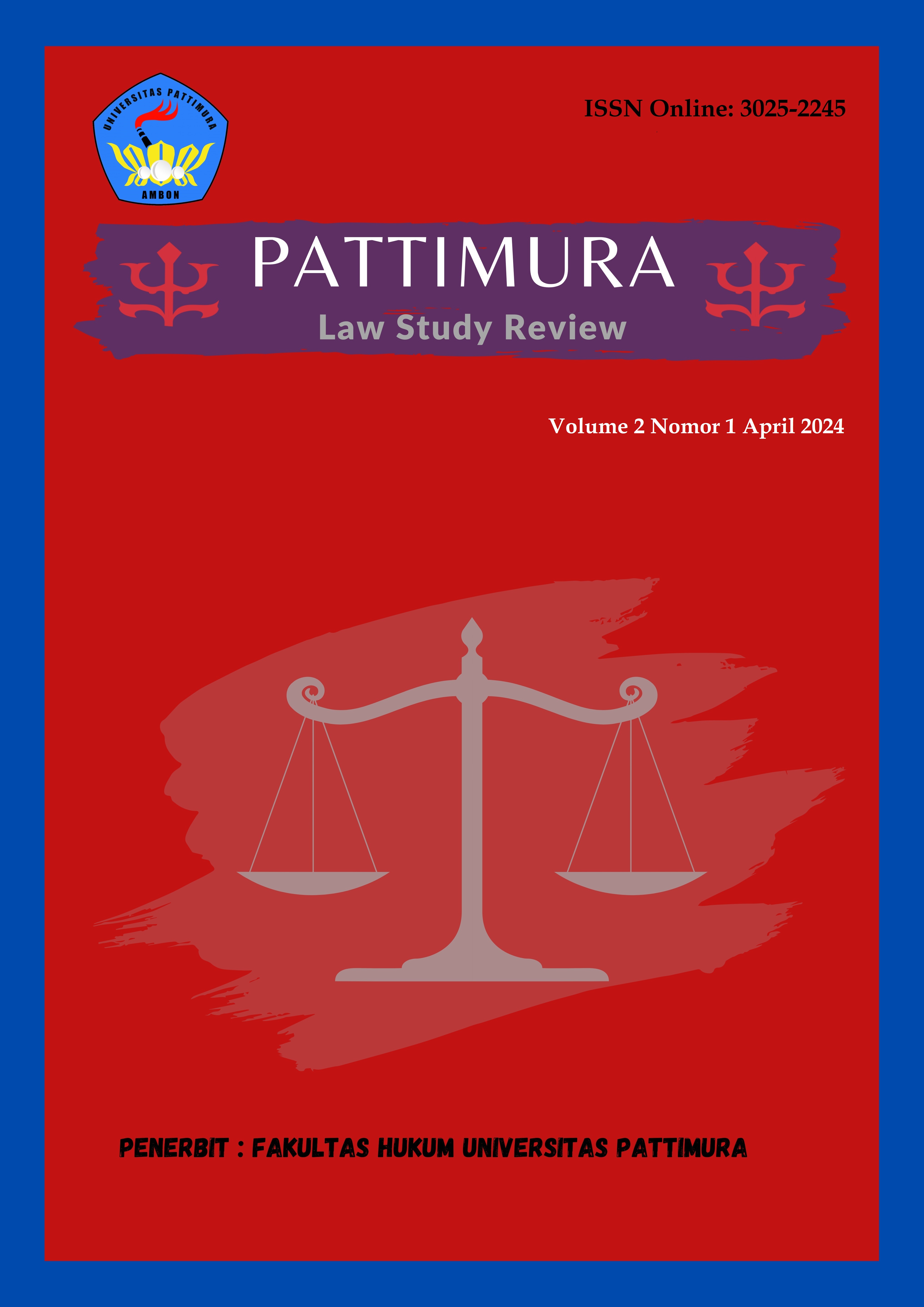Kebijakan Krimimnal Perbuatan Ujaran Kebencian (Hate Speech) Melalui Media Sosial Menurut Hukum Pidana
Abstract
ABSTRACT: Hate speech is a prohibition stipulated in Article 28 Paragraph (2) of Law Number 19 of 2016 concerning Amendments to Law Number 11 of 2008 concerning Electronic Information and Transactions which prohibits everyone from spreading hate speech. This act is an unlawful act because it violates human rights, such actions can be carried out not only directly but also on social networks which make people freely criticize and express hatred. Therefore, this paper aims to review and analyze the acts and forms of hate speech through social media. The research method used in this writing is Normative Juridical, the problem approach used is a statutory approach, case approach, and conceptual approach, the legal materials used are primary legal materials, secondary legal materials and tertiary legal materials. The procedure for collecting legal materials in this writing is carried out by the literature study method, the processing of legal materials in this writing is carried out by systematizing legal materials by carrying out the selection of legal materials and the analysis used in this writing uses a qualitative analysis method. Based on the results of the research, it is explained that the criminalization of hate speech through social media is an act that violates the law and can be subject to criminal sanctions, the provisions regarding hate speech in Indonesia that exist at this time as stated in Articles 156, 157, 310, 311 of the Criminal Code, Article 28 jis Article 45 paragraph (2) of the ITE Law, and Article 16 of Law Number 40 of 2008 concerning the Elimination of Racial and Ethnic Discrimination, have clearly regulated the prohibited acts and criminal threats. Hate speech crimes take several forms such as insults, defamation, blasphemy, unpleasant actions, provoking, inciting, and spreading false news on social media that cause actions that violate the rule of law.
Downloads
References
Jurnal
Denny Latumaerissa, “Tinjauan yuridis tentang penerapan ancaman pidana mati dan tindak pidana korupsi”, jurnal sasi, vol 20 no 1 bulan januari-juni 2014.
Dewi Bunga,”Politik Hukum Pidana Terhadap Penanggulangan Cybercrime”, Jurnal Legislasi Indonesia, Vol. 16, No. 1, Maret 2019
Dewa Gede Giri Santosa, “The Effectiveness of Criminalizing Hate Speech through Electronic”, Scholars International Journal of Law, Crime and Justice, 2021.
Elsa Rina Maya Toule, “Supremasi hukum dan Supremasi etika dalam penegakan hukum diindonesia”, jurnal sasi, volume 28, edisi 1 maret 2022, doi:10.47268/sasi.V28i1.752
Febriyani, M., DM, S., & Husin, BR, “Analisis Faktor Penyebab Pelaku Melakukan Ujaran Kebencian (Hate Speech) Dalam Media Sosial”, Jurnal Poenale, 2018.
I Made Kardiyasa, dkk, “Sanksi Pidana Terhadap Ujaran Kebencian (Hate Speech)”, Jurnal Analogi Hukum, Volume 2, Nomor 1, 2020.
Julianus Latupeirissa, "Penyebaran Berita Bohong (HOAX) Pada Masa Pandemi Covid-19 dan Upaya Penanggulangannya di Provinsi Maluku", Jurnal Belo, Volume 6 Nomor 2 Februari 2021 - Juli 2021.
M.E. Fuady,” Cybercrime: Fenomena Kejahatan melalui Internet di Indonesia”, MediaTor, Vol. 6, No. 2, Desember 2005.
Meri Febriyani, “Analisis Faktor Penyebab Pelaku Melakukan Ujaran Kebencian (Hate Speech) Dalam Media Sosial, Poenale”: Jurnal Bagian Hukum Pidana 6, No. 3, 2018.
Patrick Corputy, "Penyuluhan hukum bagi remaja GPM Eden tentang penyebaran hoax melalui media sosial", Jurnal Pengembangan Masyarakat, Vol.3, No.3 November 2022.
Yanti Amelia Lewerissa' "Kebijakan kriminal ujaran kebencian di media sosial terhadap harkat dan martabat agama masyarakat di abad digital", Kemajuan dalam Penelitian Ilmu Sosial, Pendidikan dan Humaniora (ASSEHR), volume 187.
Buku
Abdul Wahid dan Mohammad Labib, Kejahatan Mayantara (cyber crime), PT. Refika Aditama, Bandung, 2005.
Aep S. Hamidin, Tips & Trik Kartu Kredit Memaksimalkan dan Mengelola Resiko Kartu Kredit, Yogyakarta: MedPress, 2010.
Adami Chazawi dan Ardi Ferdian, Tindak Pidana Informasi Dan Transaksi Elektronik, MNC Publishing, Malang, 2015.
A Yudha Prawira, Upaya Kepolisian Dalam Menanggulangi Kejahatan Ujaran Kebencian (Hate Speech) Berdasarkan Surat Edaran Kapolri Nomor SE/06/X/2015, 2016.
A. Ridwan Halim, Hukum Pidana dalam Tanya Jawab, Jakarta, Ghalia Indonesia, 1986
Sunarso, H. Siswanto, Viktimologi dalam Sistem Peradilan Pidana. Jakarta: Penerbit Sinar Grafika, 2018.
Budi Suhariyanto, Tindak Pidana Teknologi Informasi (CYBERCRIME), PT. Raja Grafindo Persada: Jakarta, 2014.
Budijarto, A., Pengaruh Perubahan Sosial Terhadap Nilai-Nilai yang Terkandul Dalam Pancasila. Jurnal Kajian Lemhannas RI, 2018.
Buchari Said, Hukum Pidana Materiil, Bandung, 2015.
Dikdik M. Arief Mansur dan Elisatris Gultom, Cyber Law Aspek Hukum Teknologi Informasi, Bandung: PT Grafika Aditama, 2014.
Elsa Rina Maya Toule, Supremasi hukum dan Supremasi etika dalam penegakan hukum diindonesia, jurnal sasi, volume 28, edisi 1 maret 2022, doi:10.47268/sasi.V28i1.752
Muladi dan Barda Nawawi A, Teori-teori dan Kebijakan Pidana, Penerbit Alumni, Bandung, 1992.
Sahrul Mauludi, Awas Hoax!, Elex Media Komputindo, Jakarta, 2018.
Matthew B. Milles dan Michel Huberman, Analisis Data Kualitatif, Jakarta, 1992.
P.A.F. Lamintang, Dasar-dasar Hukum Pidana Indonesia, Bandung, Penerbit: Sinar Baru, 1984.
Soemarno Partodihardjo, Tanya Jawab Sekitar Undang-Undang No. 11 Tahun 2008 tentang Informasi dan Transaksi Elektronik, Jakarta: PT Gramedia Pustaka Utama, 2008, hal. 2.
Sutan Remy Syahdeini, Kejahatan dan Tindak Pidana Komputer,Pustaka Utama Grafiti: Jakarta, 2009.
Sunarso, H. Siswanto, Viktimologi dalam Sistem Peradilan Pidana. Jakarta: Penerbit Sinar Grafika, 2018.
Copyright (c) 2024 Jofransly Imanuel Noija, Elsa Rina Maya Toule, Denny Rina Maya Latumaerissa (Author)

This work is licensed under a Creative Commons Attribution-NonCommercial 4.0 International License.
Authors who publish their manuscripts in this Journal agree to the following conditions:
- The copyright in each article belongs to the author, as well as the right to patent.
- Authors are able to enter into separate, additional contractual arrangements for the non-exclusive distribution of the journal's published version of the work (e.g., post it to an institutional repository or publish it in a book), with an acknowledgment of its initial publication in this journal.
- Authors are permitted and encouraged to post their work online (e.g., in institutional repositories or on their website) prior to and during the submission process, as it can lead to productive exchanges, as well as earlier and greater citation of published work.
- Authors have the right to self-archiving of the article (Author Self-Archiving Policy)













